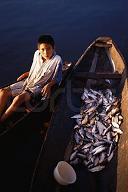
The Study in Aesthetics
The very small children in patched clothing,
Being smitten with an unusual wisdom,
Stopped in their play as she passed them
And cried up from their cobbles:
Guarda! Ahi, guarda! ch’e b’ea!
But three years after this
I heard the young Dante, whose last name I do not know—
For there are, in Sirmione, twenty-eight young Dantes and thirty-four Catulli;
And there had been a great catch of sardines,
And his elders
Were packing them in the great wooden boxes
For the market in Brescia, and he
Leapt about, snatching at the bright fish
And getting in both of their ways;
And in vain they commanded him to sta fermo!
And when they would not let him arrange
The fish in the boxes
He stroked those which were already arranged,
Murmuring for his own satisfaction
This identical phrase:
Ch’e b’ea.
And at this I was mildly abashed.
I sit on the front porch, taking in the sky, feeling the breeze on my cheek, watching birds flit from tree to tree. A cloud drifts overhead, and its shape is radiant of the morning sun. An ant crawls over my shoe, then down its other side, continuing toward a crack in the concrete. I know if I don't move my shoe another ant will soon follow the spore, up over my shoe, down the other side, into the crack. At the moment, I don't care. With the sun in its ascendancy, the ant on my shoe, I am beyond even the Cistine Chapel in the Vatican. Adam's finger reaches across the dome for God's miraculous touch. It is all there, in that sky, the breeze, the birds, the ants, the sun. I am Michelangelo and this is the moment of Creation. I am both Adam's finger and God's touch. This is beauty, and it is all.
Somewhere in The Hero With A Thousand Faces, Joseph Campbell said that people don't search for meaning. Instead, they seek to live in such breadth and depth that life itself becomes the meaning. In Zen and The Art of Motorcycle Maintenance, Robert Pirsig says that quality transforms, and that whatever we think we seek, we are really after quality. Both Campbell and Pirsig have in mind a beauty that can't be named, and it is this beauty that yields truth, a truth worth living for. It is an experience, not words, images, or numbers.
John Keats said that truth is beauty, beauty, truth. Paul Dirac would have agreed with him, although he had his equations in mind. "It is more important," he said, "to have beauty in one's equations than to have them fit the experiment." He meant that "if one is working from the point of view of getting beauty into one's equations, and if one has a really sound insight, one is on a sure line of progress." When asked how he recognized beauty in his math, Dirac replied that he felt it. It couldn't be explained. Nobody can explain it. He added that it's like Beethoven. If somebody doesn't appreciate the beauty of, say, the Ninth Symphony, then nothing can be done for him. Dirac stated that Einstein had this same point of view.
With beautiful sardines is where it all stops, of course. You can't get any further than that. Oh, don't get me wrong. The aesthetic sense can take you into theories, equations, poems, symphonies, canvases, and fine thoughts, but you are moving away from it. Once you are in that moment, you have all the truth you will ever have. Yes, a Buddha can expand its opening, but that's it. Everything else is an attempt to explain it. Quantum theory spins itself out of an exquisite aesthetics, as does good poetry, but they are lain over that which we ultimately cannot describe, which is what Persig finally says with his qualia.
It is the mystery that mind tries to explain, but which will always remain as a dimension of the universe unavailable to our understanding. One of the Upanishads, says "When you see a sunset or a mountain and you pause to exclaim, 'Ah,' then you are participating in divinity."
And at these moments we are at least mildly abashed.

No comments:
Post a Comment